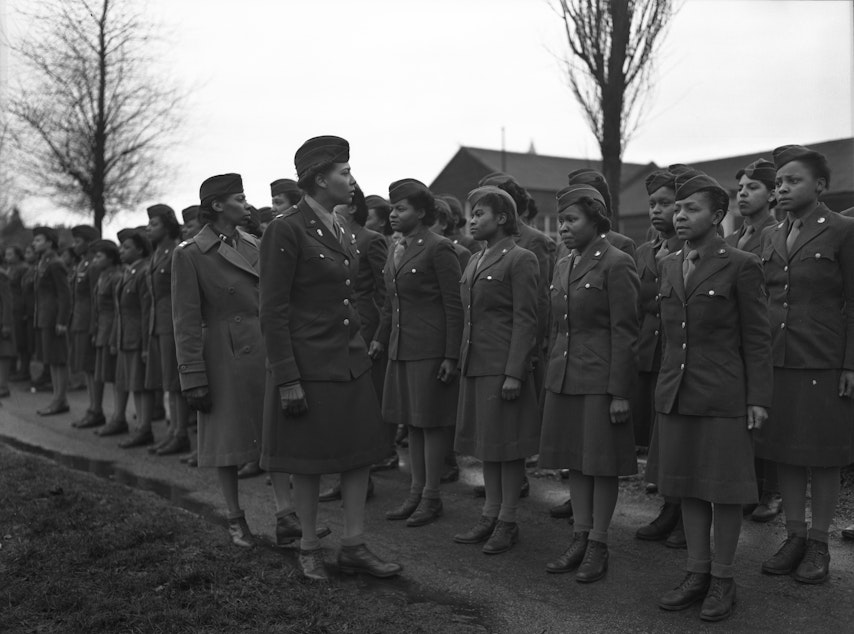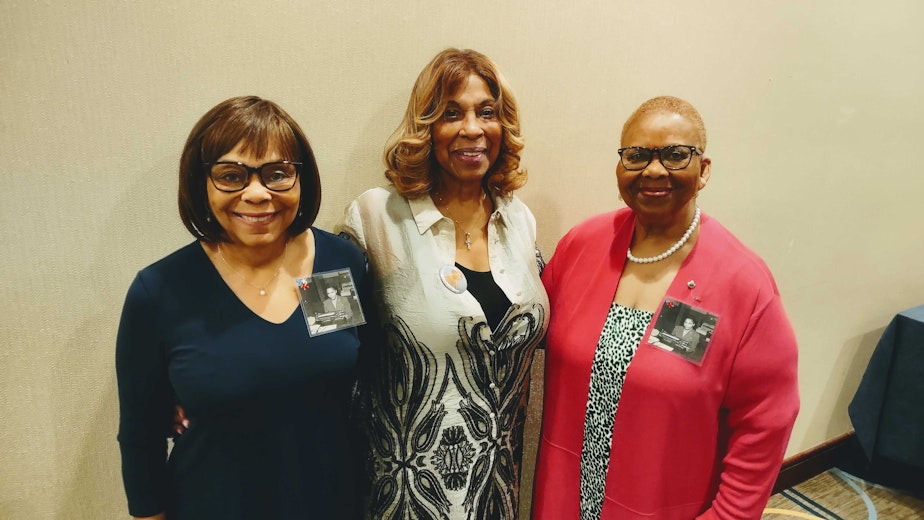Remembering the only predominantly Black, all-women U.S. military unit to serve overseas in WWII

This Memorial Day, we’re remembering the legacy of the WWII era unit, the 6888 Central Postal Directory Battalion. It was the only predominantly Black, all-women’s U.S. military unit to serve overseas, and is also the subject of a recent Netflix movie. Their mission was to sort through a backlog of more than 17 million pieces of mail and to deliver it to war-weary soldiers scattered across Europe, longing for words of encouragement from home.
They had six months to complete the job. They did it in three.
In April, the battalion, nicknamed the Six Triple Eight, became only the second women’s military group in U.S. history to formally receive the Congressional Gold Medal. During the ceremony, U.S. House Minority Leader, Democratic Rep. Hakeem Jeffries of New York spoke about the need to recognize the battalion’s accomplishments.
“We reject any efforts now to erase this history. And that’s why this bipartisan ceremony is so particularly important,” he said.

The timing of the award and public recognition is significant because time is running out for the remaining women of the Six Triple Eight. Like many who served during WWII, the battalion's numbers are declining and there’s concerns about preserving their stories. Not only did the women of the Six Triple Eight have to face logistical hurdles of delivering millions of pieces of mail, but they also had to grapple with the dangers of wartime.
Sponsored
In an interview in 2020 with former Pfc. Indiana Hunt Martin, she recounted the many challenges that they faced, including being fearful of Nazi U-boats when she was sent overseas before arriving in Europe.
“I heard a big bump on the ship [ride] and we [thought] we were being blown up. Scared the hell out of us,” she said.
Martin was initially not happy about her assignment. “We saw the pile of mail and we didn’t say any nice words.”
When asked how the Six Triple Eight should be remembered, she said: ‘Now that they’ve discovered how important we were at the time, they need to remember the living and the dead - how we did a good job when we were needed.”
Martin would die two weeks after that 2020 interview. Out of the original 855 members, only two are still alive. Members of the six triple eight were also aware they were expected to fail.
Sponsored
They were 853 Black women and two Latinas, serving a nation – devoted to Jim Crow racism, and one that saw them as inferior, and less intelligent, even though more than 80 percent of them were either teachers or college graduates.
That’s why Sandra Dean says it was no surprise that her mother and instilled in them a duty to work hard as she recounted her mother’s lessons.
“‘Don't worry about what anyone else is doing, and do it exceedingly over and beyond. And don't look for rewards’ and I think that was one of the things I recall with our grades. She would say that is to be expected that you get an A or a B,” Dean said.

It was the same expectation the late Sgt. Phyllis Inez Galloway Meekins had of her daughter Denise McBride, who now leads a group devoted to bringing Six Triple Eight descendants together. McBride knew very little about her mother’s service and the journal she kept until after she died in 2005.
Sponsored
“As long as my father was living, he had all of those papers so when he died all of that came to me and I started going through it, and she never talked about it,” McBride said.
Neither did Marissa Pointer’s mother, Pfc. Jacquelyn Fuller, nor her aunt Pfc Winona Fuller. The sisters grew up together and died within two months of each other in 1999. Pointer said she didn’t know the details about their service until she saw the new Netflix movie.
“And when we saw their names scrolling [during the credits], I cried and I screamed. I was so elated. It touched my heart. And to know she went through discrimination and the tough job that they had and the danger, I don't want to say I love her more but I have so much more of an understanding of her life”, Pointer said.
Descendants members of the Six Triple Eight – including myself – often wonder why these mothers, aunts and grandmothers didn’t talk about their service. We’ll never know exactly why, all that matters now is that our nation and the entire world know about the job they did. It was a job well done.
Editor's note: Angela King is a descendant of Pfc. Laura Amelia Bias, one of the members of the Six Triple Eight.



